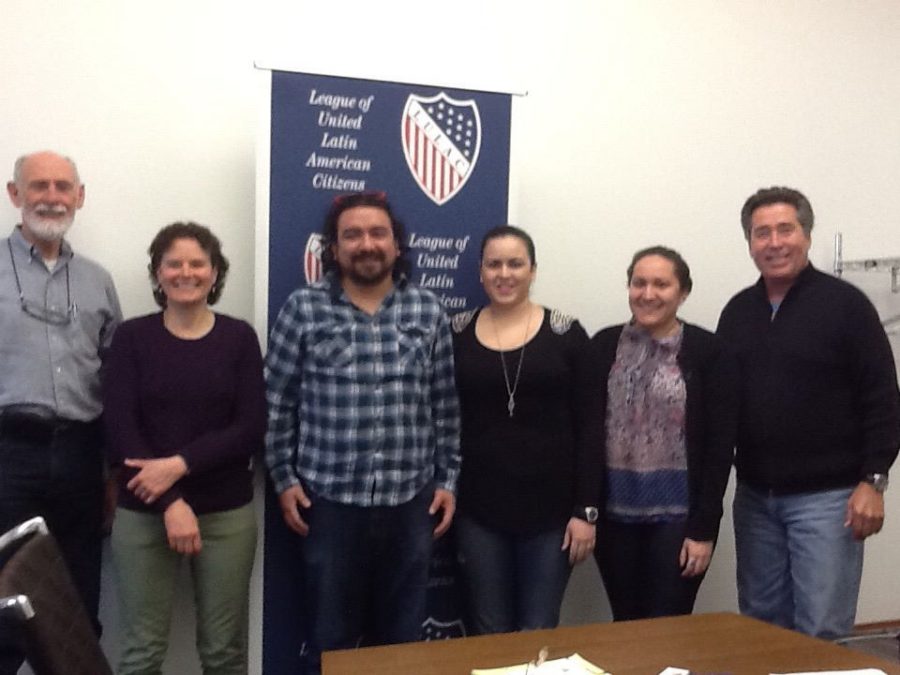International Latino rights organization opens council in Ames
Ames City Council members met on Saturday to initiate the LULAC council.
March 31, 2015
The longest standing Latino civil rights organization is bringing a branch to Ames to encourage and help the Latino Community in the Area.
The Ames League of United Latin American Citizens, also known as LULAC, was recognized on Wednesday, making it the 10th LULAC council in the state. The Iowa councils add up to about 400 members.
“I love the name. It covers everybody,” said Fernando Aveiga, ISU alumnus and president of the Ames council.
The Ames council has more than 10 members, which include ISU students Maria Alcivar, graduate in human development and family studies, Maria Melendez, senior in industrial technology and Sandra Rosado, who graduated in the summer of 2013. The community chair is Susan Benner and ISU sociology professor Jan Flora.
Aveiga said he wants to focus on attracting Latino students and local businesses. The recruiting process will be the first half of the year. He plans to recruit two groups of students and businesses by promoting a matching-funds scholarship through the international LULAC available for all the councils. For every dollar donated for scholarship money, LULAC matches $.60 toward the same scholarship, for a total of $1.60 donated per dollar.
“That incentive with the 60 cents per dollar match for scholarship funds will be the main drive and then from that we can create other events,” Aveiga said. “We want the mainstream community to help Latinos. That’s what we want. And then Latinos to help themselves.”
The LULAC Ames council has yet to elect official member positions. Officer elections will be at the next meeting at noon on April 11 at the Ames Public Library. Joe Henry, the ISU LULAC director, appointed Aveiga as president until the elections.
“I kind of appointed him temporarily, but I kind of think he’ll win [this] election,” Henry said.
The following weekend, the council will be at Davenport for a state convention, where MSNBC news will film the event.
“They are very curious about what Latinos are doing in Iowa,” Henry said.
The first LULAC council to form was in Fort Madison in 1957. The Davenport council formed the year after. The Davenport council is the largest in the Midwest with about 200 members, a budget of about $250,000 per year and more than half a million dollars given in scholarships since its inception.
The Davenport council partnered with city government, city boards and school groups. They give $25,000 per year in scholarships.
“[The scholarship] doesn’t have limitations. [It’s to] assist to meet financial needs, period,” Aveiga said.
LULAC is the oldest Latino civil rights organization and was formed in 1929. It was the formation of three Latino organizations that wanted to help displaced Mexican-Americans. About 77,000 would lose their property rights after the Mexican-American War of 1848.
“We have fought for many ongoing civil rights for equality for equity,” Henry said.
It’s taken about three or four years for the group to become official and connect with young and old Latinos. A few members of the group have had discussions in the past about setting up a council in Ames, but it took someone such as Aveiga to get it started, Henry said.
“It’s just finding who the leaders are and finding leadership and building upon that,” Henry said.
Aveiga is originally from Ecuador and graduated from Iowa State with his master’s in 2007. He taught at Iowa State and is currently teaching at Des Moines Area Community College. Since meeting Joe Henry, Aveiga has been mentored to become a real estate agent for Coldwell Banker.
Aveiga’s background is in development and economics.
“LULAC is my channel to implement economic and political agendas that will help Latinos move forward,” Aveiga said. “So it’s the perfect platform for me to join.”
Of the 20 percent of school-aged children in Iowa in large school districts such as Des Moines Public schools, 6 percent are Latino. Out of 32,000 students in kindergarten through 12th grade, 23 percent are Latino. More than 20 percent are from minority families, most of whom are Latinos.
“Many will [be] becoming 18. We need to get them registered to vote,” Henry said. “We need to make them a political force in Iowa, so we can hold our elective leaders accountable.”
Henry said more students should become leaders and his advice to ISU students is that LULAC would be a vehicle to become a leader, to become politically active and to gain job opportunities at national conventions. Many Latino youth go to the national conventions because there are many job opportunities offered, he said.
Aveiga said everyone’s ideas are welcome and will not be turned away.
“We definitely welcome all sorts of ideas, but the best part of being part of a council is through the process of making decisions and executing our agenda and executing our strategic plan. Everybody has to come to an agreement because we are not just discussing ideas,” Aveiga said. “The important part of the business is executing and giving the service to the community. I think the tone in Ames is open to everybody to join.”

















